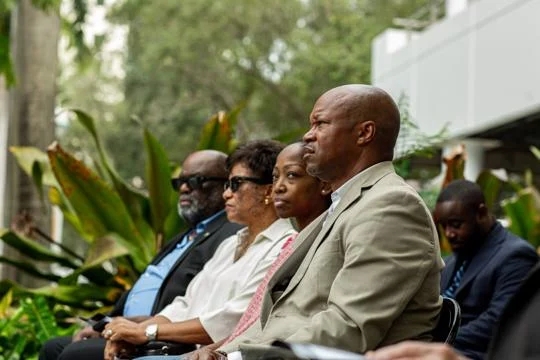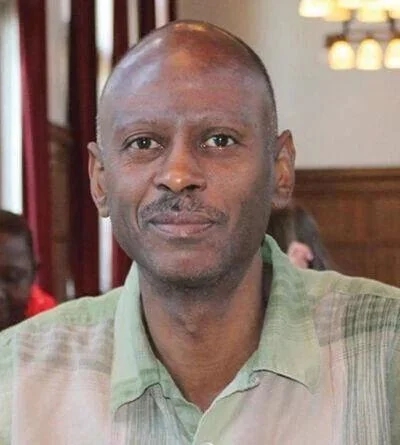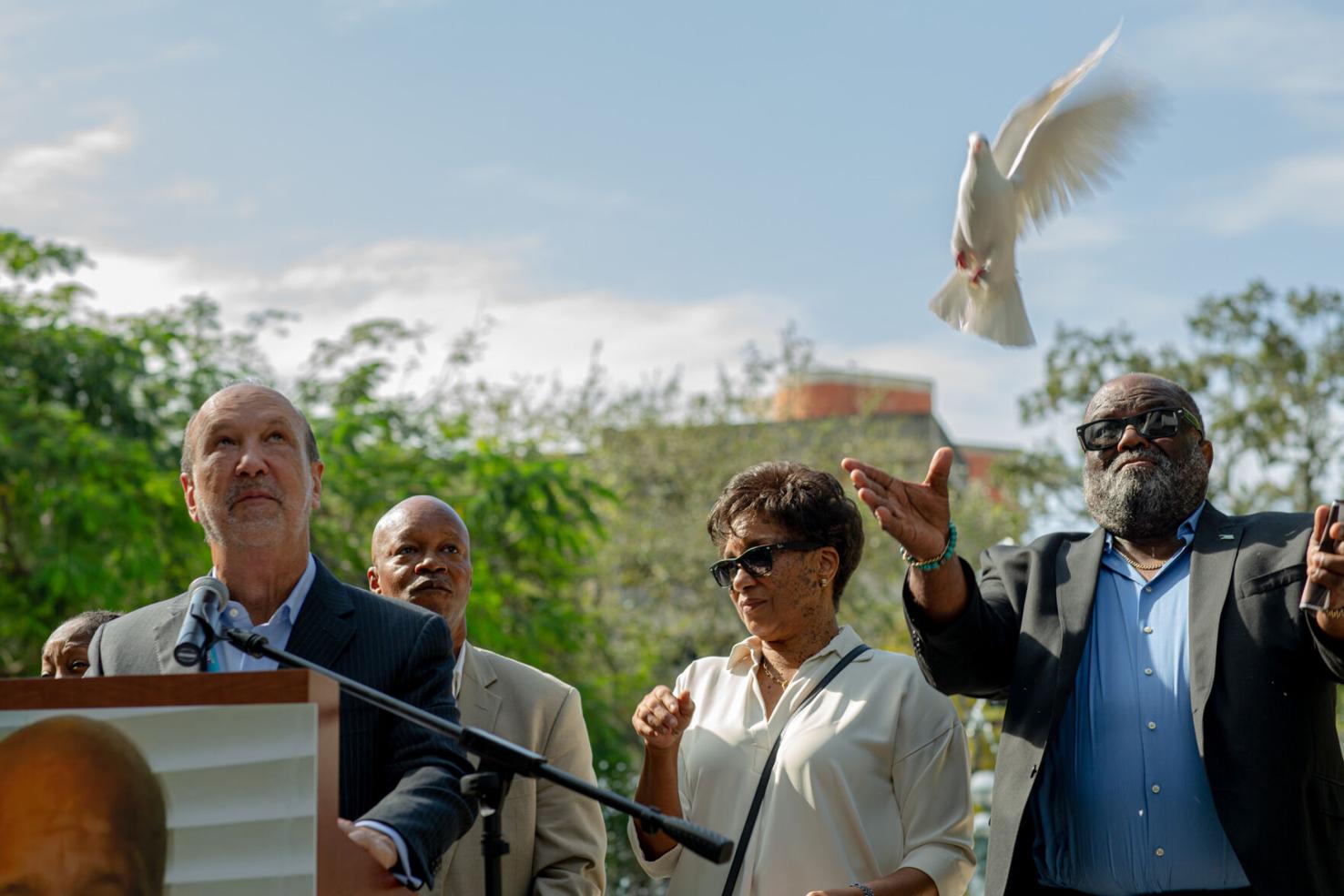It’s been one of the deadliest years for the homeless in Miami-Dade County in recent memory. In 2022, 216 homeless people died on the streets of our community, one of the largest figures on record since Homeless Persons Memorial Day was created in 2000.
Homeless advocates recently gathered to honor the memory of those lost during the annual Homeless Persons Memorial Candlelight Vigil Dec. 16. It’s part of a national effort to raise awareness about the tragedy of homelessness and promote advocacy.
The memorial service included a special dedication to Jerome “Jerry” Antonio Price, who was 56 when he was fatally shot Dec. 21, 2021, while sleeping on the sidewalk in Miami’s Wynwood Design District. Price’s family wanted him to be the face of homelessness and the many people who go unidentified and unclaimed by their families or friends.
“I’m here with family to celebrate with you the life of our loved ones we’ve lost as they were living the harsh reality of homelessness,” said Jerome’s brother, Terrance Price, during the memorial service. “My hope for all the families is that the national Homeless Day memorial service will be a beacon of light to commemorate those who meant so much to us. May you find comfort in knowing that your loved one’s life was precious and meant something.”
Death among the unhoused population ranges from natural causes and disasters to addiction and illness. Jerome Price, along with 59-year-old Manuel Perez, who was also homeless, were victims of the senseless acts of violence often visited upon the homeless.
They were murdered by a suspected serial killer, Miami real estate agent Willy Suarez Maceo, who faces two counts of first-degree murder and an additional count of attempted murder for the non-fatal shooting of another man living on the streets.
“He took advantage of the vulnerable. Those individuals have families. It’s just sad, senseless and stupid. But he’s in jail now, and that’s where he’ll be for a while,” said Terrance Price.
Hard-to-come-by help
The Price family had lost contact with Jerome for more than a month and didn’t know he had died until receiving a call from a nephew who’d learned of the murder via a WPLG Local 10 News report. The family was accustomed to long periods without contact from Jerome, but he would always turn up. Losing him to murder was unimaginable.
Jerome Price had suffered from alcoholism since the late 1990s and ultimately become homeless as a result of his addiction, according to Terrance Price. His family had offered him opportunities to stay home and receive help, but like so many others, pride took over and he often refused assistance.

“We tried to give him help, but he didn’t want it. There’s nothing you can do; we just prayed he was OK. We kept in contact sometimes and headed to where he was to take him clothes and money, but he would say he was fine,” said Terrance Price. “He was in an accident, and I told him to stay as long as he wanted at my house to rehabilitate, but the streets called him back.”
In Miami-Dade County, the Homeless Trust administers funding, provides oversight for housing, and facilitates all overall homeless assistance with numerous nonprofit organizations in the community that provide shelter and support services to the unhoused.
David Perry, a homeless rights advocate and president of the Coalition to Advance Racial Equality, commends the county for allocating funds to help the homeless, but says the Homeless Trust must do more to fulfill its mission.
“The Homeless Trust helpline is essentially dysfunctional, and they should probably eliminate it rather than give out this false promise. I talk to people who work at that help level and they tell people immediately they’re just going to be on a waitlist,” said Perry. “Every week, I still get calls from struggling families and people because they thought they could get some help and they’re faced with actually sleeping on the concrete because they’re not getting any.”
But Perry reserves his greatest criticism for the city of Miami.
Surviving shoddy treatment
In May 2020, Miami city workers and police dismantled and wiped clean a downtown homeless encampment, stating that the people living there were trespassing per warning signs posted just the day before. Local homeless advocates called the eviction – which happened at the peak of the COVID-19 pandemic – cruel and inhumane.
“The police should never be in the forefront of a homeless issue because it isn’t a criminal justice issue. Homelessness is a social issue, a housing issue and a health issue,” said Perry.
In 2021, as reported in The Miami Times and the Biscayne Times news outlets, the city implemented a plan to eliminate homeless encampments in five districts called the “City of Miami Street Clean Up and Encampment Resource Plan.”
The city began “cleaning up” the streets of tents and homeless individuals’ belongings in February 2021 and is currently facing a federal lawsuit for allegedly destroying homeless people’s property.
Then, in July 2022, the city was again heavily criticized when it supported Commissioner Joe Carollo’s “tiny homes” proposal to move Miami’s homeless population to Virginia Key. The idea was dropped after a barrage of negative publicity and fierce opposition from homeless advocates and Miami-Dade County.
“The city is the primary mover of criminalization of homelessness. They’ve intentionally traumatized the homeless and purposely punished people sleeping on the street,” said Perry. “They pretend they care about the homeless. Maybe as individuals they do, but as officials they are simply making life cruel and much worse for the people homeless on the street.”
Ron Book, chairman of the Homeless Trust, concedes that Virginia Key was the wrong location for Carollo’s “tiny homes” project, but said an opportunity came out of that failed idea.
“We found a place to take Joe Carollo’s ‘tiny homes’ project … He managed to create a conversation that I’ve been trying to create, and Virginia Key allowed that conversation to take place, which allowed me to get $43 million and find a landing place for his tiny homes,” said Book. “Sometimes my relationship with the city is extraordinary and occasionally it stretches, but a true partnership doesn’t end. You find the elasticity to bring that back to normal.”
Perry recognizes the system that requires the city’s and county’s need for one another to function and fund departments and programs. But both entities have different approaches toward homelessness, one that the city, he says, needs to change in order to make life bearable for people living on the street.

“People like Commissioner Christine King need to change their mindset, especially since she sits on the board of directors for Camillus House. She needs to be educated that some people do not choose to sleep on the street. It’s a result of a dysfunctional system,” said Perry. “We need to provide compassion, and if Christine King wants the homeless out of her city, she needs to take more measured, long-range plans to collaborate with the Trust and to use her own city funds.”
Sharing their stories
Presenters at the memorial service spoke to their experiences with homelessness and highlighted the risk people face for being unhoused at any given moment, including circumstances that are entirely out of their control.
Mel de Miami, a Miami-Dade County artist who is part of the Youth Voice Action Council and Helping Our Miami Youth, paid tribute to the homeless lives lost at the service with her music. She sang through tears while desperately trying to keep her voice from breaking.
“I was homeless and lived in a homeless shelter for nine months when I was 19, and I can’t help but think when I look at the names on the board [that I may have] I walked past them or had befriended them,” she said. “People forget the homeless can be any of us. We’re one paycheck away, one medical bill, natural disaster or domestic violence relationship from being homeless. It could be any of us.”


You must be logged in to post a comment.